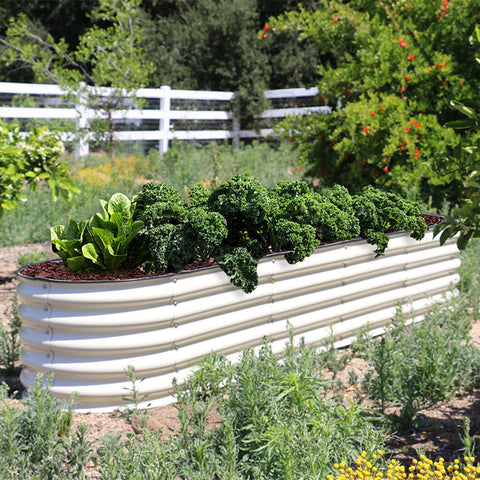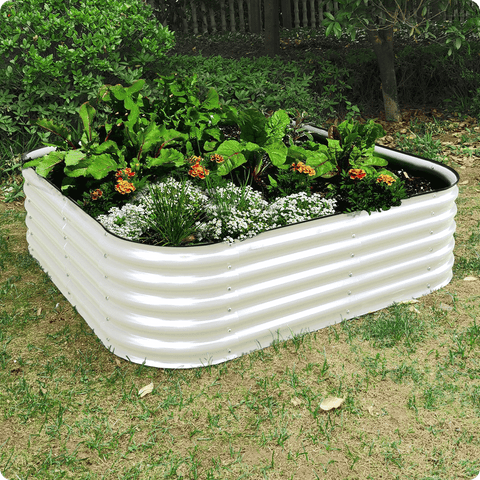5 Tips for Planting Cucumbers on Raised Garden Beds
Cucumber is one of the most widely used vegetables in the garden. They can grow vertically, in raised garden beds, containers, and even in your landscape. With a little care and attention, you can enjoy rich cucumbers throughout the summer.
Therefore, if you are looking for a simple and delicious way to increase vegetable production, planting cucumbers on the raised garden bed is your best choice! Here are five tips for planting cucumbers in a raised garden bed. Let's get started!

Position
When you want to plant cucumbers on the garden bed, it is important to choose the right position. The location should be sunny, because cucumbers need at least six hours of sunlight every day. However, if you live in a very hot summer climate, they will need some shade to protect them from the hot afternoon sun.
Most cucumbers are climbing plants, so they need something to climb up. If you plant them on elevated beds, make sure there is another plant nearby that can climb them (such as sweet corn) or the trellis.
Cucumbers require a lot of space to grow, so make sure you have enough space to accommodate a garden bed at least 4 feet wide. If you plant cucumbers on a trellis, the garden bed should be at least 6 feet wide.
Preparation
To prepare a raised garden bed for planting, mix some compost or manure. Cucumbers thrive in loose, well drained soil. They can be directly planted underground or on mountains. If you plant on a mountain, make sure there are at least 4 plants on each mountain. Space the plants 12 inches apart.
Cover
If you plant cucumbers on a raised garden bed, mulching is a good way to keep the soil moist and increase yield.
Cucumbers like light, airy coverings, such as straw or crushed leaves. Avoid using anything too dense, which may suffocate the plant. Lay it in a thick layer (about 1 inch) to cover the entire bed, ensuring that all cucumber plants are covered.
Watering
Cucumber is a thirsty plant, so the best way to control water volume is to use the drip irrigation system to water cucumber. However, if you water by hand, be sure to water the soil around the cucumber plant, not the leaves. Water early in the day so that the leaves have time to dry before nightfall. If you water later in the day, the leaves will stay wet overnight, making it easier to get sick.
In general, cucumbers require 1 inch of water per week and may be more during any summer heat wave. You can use a rain gauge to measure the rainfall received by the elevated bed. If you supplement irrigation, please add the water from all sources to ensure that you do not over water or under water cucumber plants.
Overwatering cucumbers can cause disease and decay. The leaves turn yellow and the plants produce fewer fruits. Inadequate watering will result in smaller and deformed cucumber fruits.

Diseases and insect pests
The warm and humid environment is very suitable for many common cucumber pests, such as aphids, cucumber beetles and whiteflies. These pests can spread diseases such as mosaic virus and bacterial wilt.
In order to prevent pest problems, it is important to start with healthy plants. Select varieties that are resistant to common cucumber problems in your area. Purchase certified disease-free seeds and grafts from reputable nurseries.
Cucumber plants need a lot of water, but as mentioned above, avoid wetting the leaves and use mulch to prevent fungal disease.
Insecticidal soaps or neem oil can be used to control most software pests, such as aphids and whiteflies. Cucumber beetles are more difficult to control, but several effective insecticides are available. Bacterial wilt can be controlled by rotation and immediate removal of affected plants. Once mosaic virus infects plants, there is no effective treatment, so preventing its transmission is the best defensive measure. If the invasion or disease has been out of control, it is better to destroy cucumber plants to avoid polluting nearby plants.
By taking some simple preventive measures, you can avoid the problems of diseases and pests in cucumber fields. With a little effort, you can enjoy a healthy cucumber harvest throughout the season!
Summary
If you are looking for an interesting and simple way to add home grown cucumbers to your diet throughout the summer, the raised garden bed gardening is your best choice. With a little care and some basic knowledge about how to plant cucumbers on the raised garden bed, you can enjoy your fresh agricultural products immediately.
